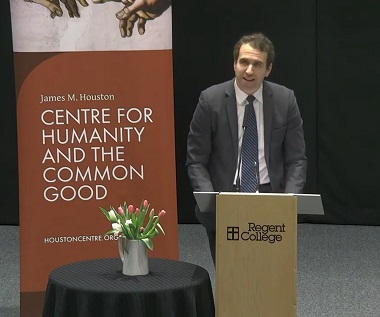
Law professor Brian Bird addressed the topic ‘Euthanasia: in Canada: Progress or Runaway Train?’ for the Houston Centre at Regent College. image from video
“Stop misleading Canadians, Minister Lametti. You’re not being forced to provide MAiD to people with mental illness, this is just something you want to do. MAiD for people with mental illness is not inevitable, it’s actually immoral. Members of your own Liberal caucus agree.”
Conservative MP Rob Moore made that statement in Parliament February 14, as the House discussed a Liberal Bill to delay broadening the application of Medical Assistance in Dying (MAiD) to people experiencing mental illness. That delay is clearly in response to mounting pressure from the public.
Outside of Parliament, many Christians, and some other communities, are hoping that this apparent setback for the Liberal’s MAiD juggernaut will cause Canadians to reconsider the whole issue.
MAiD in Parliament
Politico summed up the immediate political situation nicely in its daily Ottawa update February 14:
It looks like the government’s bid to delay the expansion of medical assistance in dying (MAiD) will pass the House of Commons without a hitch. But that one-year delay isn’t long enough for the Conservatives, who have a bill on the books that would permanently prevent people suffering solely from mental illness from accessing MAiD.
The Conservatives, Bloc Québécois and NDP have all indicated they’ll support Bill C-39, which would push back the expansion of MAiD to those whose sole underlying condition is mental illness until March 17, 2024.
The expansion is set to take place next month, but Justice Minister David Lametti says the health care system needs more time to prepare.
Conservative justice critic Rob Moore asked in the House on Monday if the government would delay the expansion “indefinitely.”
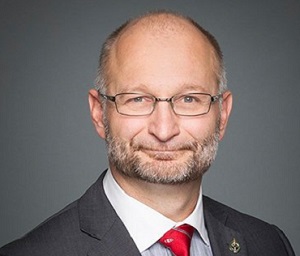
The Liberals’ Justice Minister David Lametti is pushing for fewer restrictions on MAiD.
Lametti said MAiD will only be available to the “small fraction of individuals who suffer from long-standing mental disorders, under the long-standing care of medical professionals, who are suffering intolerably and want another option.”
In other words: No.
– Be that as it may: Conservative [Abbotsford] MP Ed Fast on Friday tabled a private member’s bill that would explicitly prevent people suffering solely from mental illness from accessing MAiD. The preamble to the bill says people “should receive suicide prevention counseling” rather than medical assistance in dying.
Fast didn’t respond to interview requests from Playbook.
Private member’s bills rarely pass, but the Conservatives are clearly trying to tap into a broad current of anxiety around making assisted death available to people without physical illness. A new survey from the Angus Reid Institute found that 61 percent of Canadians support the existing MAiD law in Canada, but just 31 percent would support the expansion to those with “irremediable” mental illness, while 51 percent are opposed.
– Meanwhile: The NDP supports the one-year delay out of concern that Canadians don’t have adequate access to mental health care.
Bill C-39 passed through the House of Commons February 15.
Good intentions . . .
Opponents to MAiD may be in the minority, but they have remained vocal over the past couple of years. One significant voice in the struggle has been Brian Bird, Assistant Professor at the Peter A. Allard School of Law at UBC.
He delivered a lecture for the Houston Centre (James M. Houston Centre for Humanity and the Common Good) to a full house at Regent College February 2. Following are some comments by Bird and two other participants; I urge pastors and leaders to watch the full video.
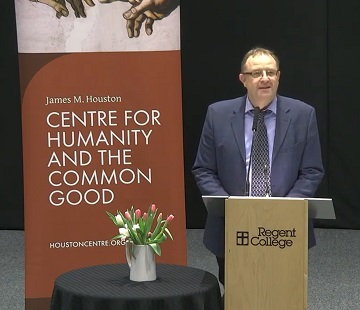
Jens Zimmermann, *** of the Houston Centre, introduced Brian Bird and the other panelists. Image from video
Houston Centre Director Jens Zimmermann introduced ‘Euthanasia: in Canada: Progress or Runaway Train?’ with these words:
The Houston Centre is dedicated to facilitating conversations on the question of human identity and the common good of society. More specifically, we want to foster the richest possible descriptions of human identity and we want to critique dehumanizing views of what it means to be human.
Given Regent’s Christian convictions, we’re particularly interested in preserving the dignity and unique worth of each person as reflective of God’s image.
As history has taught us, when social practices, for whatever reason, be it with the best of intentions, undermine human dignity, the mystery of personhood becomes quickly reduced to physical health or social utility, with predictable catastrophic results.
Many are worrying that Canada’s policies around MAiD and so on are embarking on this stark descent into inhumanity.
‘A runaway train’
Bird said that in preparing for the address, he found himself returning to the question, “Where do we start on the issue of euthanasia and assisted suicide in Canada?”
He continued:
This practice, to be clear, is not palliative care. It does not, as the abbreviation MAiD might suggest, refer to helping Canadians as they journey toward natural death by offering treatment to manage their pain or suffering.
Assisted death is the deliberate act of ending a person’s life, often through the administration of a lethal substance.
In the less than seven years since the first version of this practice became legal in Canada, the practice has dramatically expanded in scope. . . . It is also increasingly becoming indisputable to attach certain adjectives to the nature of these ripple effects – troubling, disconcerting, unethical, terrifying.
Last May in The National Post I called assisted death “a runaway train” in Canada. I for the most part I still subscribe to that view, but I also believe there is a growing consensus, across ideological, philosophical and other lines, that this view is accurate and that we accordingly need to stop this train and get it back on track.
He said Canada has become “a haven for euthanasia,” explaining clearly the steps which have so rapidly entrenched MAiD in Canadian society.
Several ‘versions’
Bird described several “versions” of MAiD.
The “first version” was federal legislation passed in July 2016, after the Supreme Court of Canada unanimously concluded in the 2015 Carter v. Canada case that the absolute prohibition on assisted suicide in the Criminal Code violated the Charter of Rights and Freedoms.
The Liberals decriminalized physician-assisted death for adult persons who were suffering intolerably from a grievous and irremediable medical condition and consented to an assisted death – where the death of that person was “reasonably foreseeable.”
Bird said Parliament’s response was “what I believe many Canadians, including perhaps some of those who advocated for what the Court ruled in Carter, expected would be not just the first, but the final, version of assisted death in Canada.”
However, “before the ink had dried,” Bird said, new lawsuits were launched to contest the “reasonably foreseeable” requirement. In 2019, a Quebec court ruled that access to assisted death was available for consenting adults, whether or not death was on the horizon.
The federal government did not appeal the ruling, but instead decided to “codify the essence of that ruling.” This “second version” was enacted in March 2021.
The legislation provided that two years later assisted death would become available for adults suffering only from mental illness. This “third version” was set to take effect next month; it is now to be delayed, but not abandoned.
Further versions may be waiting in the the wings. Bird noted that the Quebec College of Physicians recently recommended to a Parliamentary committee studying the future of assisted death that the practice should be expanded to include infants with severe illnesses.
“Such a step would not only render what is currently considered infanticide legal,” he said. “It would also mark an official abandonment of consent as a guardrail in the provision of assisted death, given that newborns and infants cannot meaningfully consent to death.”
The Parliamentary committee is also “exploring the option of rendering mature minors eligible for assisted death, or allowing Canadians to provide consent to assisted death long before they actually experience the medical circumstances and suffering that would render them eligible to die in this way, so-called advance directives for assisted death.”
A February 15 National Post article began: “Canada should amend the eligibility criteria for a medically assisted death to include minors deemed to have the “requisite decision-making capacity,” a parliamentary committee recommends.”
‘Nothing short of revolutionary’
Reflecting on these rapid changes, Bird said:
So Canada is at a critical juncture on assisted death. As the practice is further and further expanded, it becomes more and more difficult to cite reasons as to why the practice shouldn’t simply be granted to anyone who wants to end their life, no matter the reason. . . .
Perhaps it would be good to start by acknowledging that the concerns around the so-called slippery slope that were voiced at the time the Supreme Court was considering opening the door to assisted death in Canada – even voiced directly to the Supreme Court itself – has, I think it can now be said without any doubt, materialized.
Voices that warned us at the start about where this road might lead, were at times called fear-mongers and irrational. When the Supreme Court of Canada opened the door to euthanasia in 2015, the Court itself dismissed these concerns by saying that Canada has a “very different medical-legal culture” than countries which by that time had broad euthanasia regimes.
But we failed to grasp that by allowing euthanasia, we would radically reshape that culture overnight. Truth be told, I think we can fairly describe the experience in this country as resembling more of a cliff, rather than a slope. We have in these seven years lived through something closer to a freefall than a slide.
For the laws of a democratic country to change dramatically, on a matter of bedrock significance –the rate of change is usually incremental and slow. What we have witnessed in Canada since 2015, from an absolute prohibition on assisted death to assisted death being legal for any consenting adult with intolerable and incurable suffering, with expansion related to mental illness on the horizon and other candidates for assisted death in the conversation, is nothing short of revolutionary.
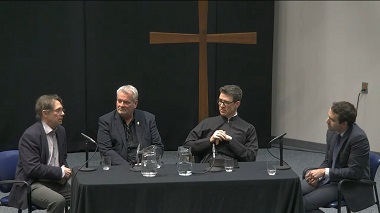
Panelists, from left: Vancouver-based physician Dr. Will Johnston, Neil Belanger (BC Aboriginal Network on Disability Society) and Rev. Dr. Andrew Bennett (Cardus). Image from video
There is more, all compelling. Joining Bird at the Houston Centre event were Neil Belanger (BC Aboriginal Network on Disability Society), Rev. Dr. Andrew Bennett (Cardus), and Vancouver-based physician Dr. Will Johnston.
Responding to a question from moderator Paul Spilsbury about how we can appeal to such a pluralistic and diverse society on this issue, Bennett said:
The gospel has always been very attractive, so it has its own internal power. The problem is us, as Christians in particular.
We have to get off our duffs, frankly. We have to be well formed. We have to be able to articulate a Christian anthropology in a captivating way, and play to that deep conscience that people have. . . .
We can offer many different sorts of arguments that maybe we sort of a soft pedal a bit at times – I think those days are over. I think it’s time to really just give it to them straight.
The panel agreed that the situation is serious, but were equally clearly not about to give up the fight.
Resources & events
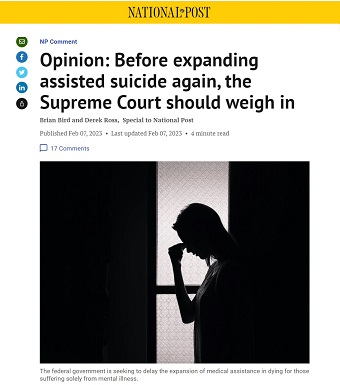 There are many good resources for those who want to learn more about the situation we are in. Here are a few:
There are many good resources for those who want to learn more about the situation we are in. Here are a few:
- Watch the Houston Centre video;
- Read this National Post opinion piece by Brian Bird and Derek Ross (Executive Director of the Christian Legal Fellowship: ‘Before expanding assisted suicide again, the Supreme Court should weigh in’;
- Consult the blog of the Euthanasia Prevention Coalition;
- Read Stories of MAiD on the ARPA Canada site;
- Take part in the Evangelical Fellowship of Canada’s February 21 webinar: ‘Supporting Canadians to Live: On MAiD + How the Church Can Engage’ and check out its resources on Euthanasia & Assisted Suicide;
- Follow Cardus, which posted a ‘Statement regarding the final report from the Special Joint Committee on Medical Assistance in Dying,’ February 16, along with links to further resources.
- Participate in Apologetics Canada’s MAiD in Canada March 2.
- Participate in ‘How Do We Discuss MAiD with our families and friends?’ at the John Paul II Pastoral Centre (March 1) and St. Nicholas Catholic Church (March 2).
